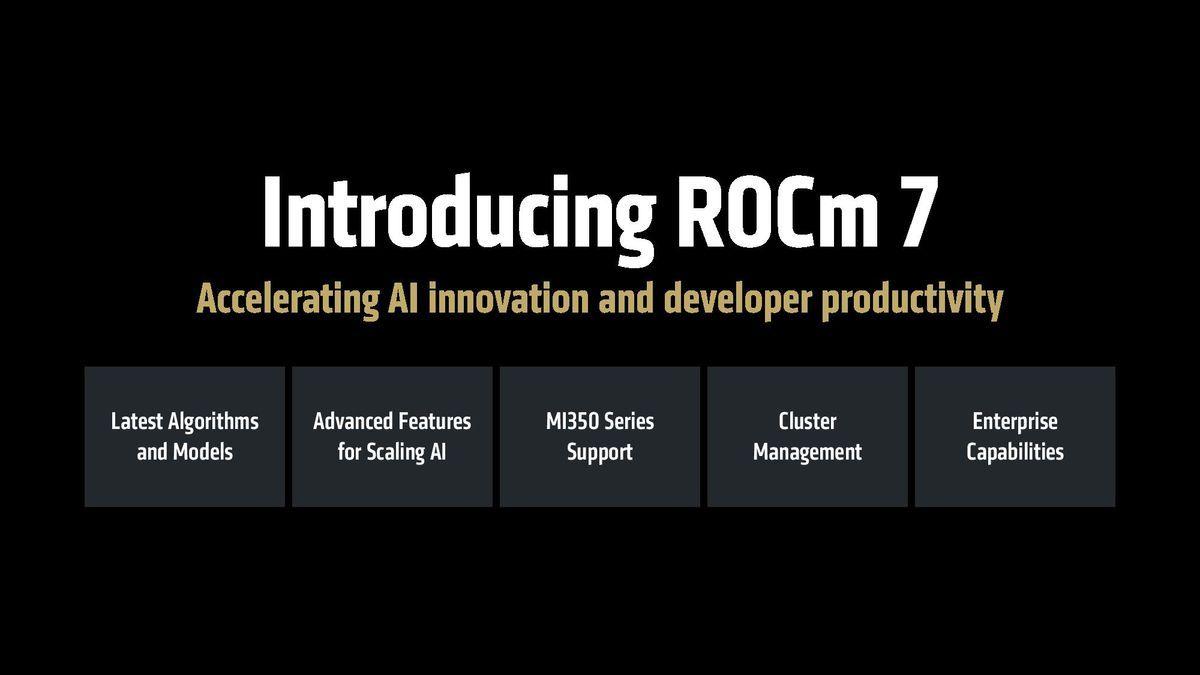AMD's RDNA 4 GPUs to Support ROCm: Balancing Gaming and AI Capabilities
3 Sources
3 Sources
[1]
AMD VP teases RDNA 4 compatibility with ROCm, but doesn't reveal official launch date
Yesterday, it was reported that AMD's RDNA 4 GPUs will not get ROCm support at launch. Unsurprisingly, this upset many developers who were planning to upgrade their setups and hoped for a seamless transition. However, ROCm support might not be far behind the launch, as AMD's Vice President of AI Software has teased what appears to be an AMD GPU from the RX 9070 series running in a dedicated ROCm environment. ROCm is an open-source software stack for GPU programming, enabling graphics cards to be used for much more than rendering graphics. ROCm enables select GPUs to power HPC and AI applications, including professional Instinct Accelerators, prosumer Radeon PRO GPUs, and a handful of consumer-grade Radeon GPUs as well. It seemed lacking for AMD to miss out on the opportunity of providing day-one support to developers. Ironically, the initial traces of Navi 48, the chip beneath RX 9070 GPUs, surfaced in ROCm updates last year. Anush Elangovan reported that RDNA 4 is "ROCm'ing on just fine," demonstrating a potential RX 9070 series GPU under rocm-smi (ROCm System Management Interface). Developers have repeatedly bemoaned AMD's slow adoption of new ROCm features and support on mainstream hardware. As of writing, AMD officially supports the RX 7000 and RX 6000 families of GPUs and the Radeon VII on Windows. Select RDNA 2 GPUs can only use the HIP runtime and don't have access to the full HIP SDK. Linux support, which is notably better and more consistent, only extends to the RX 7900 series and the Radeon VII. There are a few workarounds to get unsupported hardware up and running with ROCm, which is reportedly more successful in Linux environments. Nvidia's CUDA, on the contrary, can be run using GPUs dating back to 2006. Of course, newer architectures offer updated feature sets and fancier instructions. Given the recent advances in AI, 90% of Nvidia's revenue is a result of its data-center accelerators, driven by CUDA at their heart. This shows how critical ROCm is for AMD if it wants to compete against the mammoth that Nvidia has become in the AI space. To broaden ROCm support, the next addition will likely be Strix Halo, or the Ryzen AI MAX 300 series. With as much as 128GB of unified memory, Strix Halo is much more than a gaming laptop; it's more tailored for LLM inference and development, tackling Apple's M-series silicon.
[2]
AMD's software stack remains a weak spot -- ROCm won't support RDNA 4 at launch
AMD's upcoming RDNA 4 consumer graphics cards will not get official ROCm support at launch. According to Phoronix, AMD answered a question during its press briefing stating that ROCm support would not arrive for RDNA 4 until sometime after launch day. AMD has since not clarified what the timeline for support for the consumer cards will look like. ROCm, or Radeon Open Compute Ecosystem, is AMD's open-source answer to Nvidia's CUDA platform. The ROCm software stack is meant to enable HPC and AI workflows for consumer/prosumer products and has offered official support to AMD's consumer products on Windows since 2022. Of course, ever since launching in the pro sector, ROCm has lagged behind the standards of consumer support set by CUDA, which has offered CUDA support for its consumer products at launch for several generations. Interestingly, AMD first teased its Navi 48 GPU die through ROCm Validation Suite documentation, with its first sighting coming in April of last year. For the cards using Navi 48 not to be ROCm-ready at launch is a bit silly, if not ironic (in the Alanis Morissette sense of the word). RX 9070 XT and RX 9070 may not launch with official ROCm support for a few days, weeks, or even months, but this does not mean that they will not work with the software, nor is it unusual for a new AMD release. Since first coming to Windows, AMD has had interesting support rollouts for ROCm. When it first broadened its reach to consumer cards, ROCm's support list only included the RX 6900 XT, RX 6600, and, surprisingly, the R9 Fury from 2015, with only the R9 Fury receiving "full" software support and the 6000-series cards only working with parts of the HIP runtime. Currently, AMD's list of supported GPUs includes the full RX 7000-series, most of the RX 6000-series, and the Radeon VII on Windows, though the lower-end of the 6000-series does not support the HIP SDK, and Linux support is only extended to the RX 7900 and Radeon VII. Compared to CUDA's history of supporting Nvidia's newest consumer cards on launch day and its extensive backward compatibility stretching back to 2006, ROCm has a long way to go. We'll keep our eyes peeled for any announcements from AMD on the future of ROCm support being extended to the RX 9070 XT, 9070, and the rest of the 9000 series. AMD has also recently acknowledged user polls calling for extending full support to the 6000-series and Strix/Strix Halo mobile chips, so compatibility may take longer than hoped to arrive as AMD works through everyone's ROCm wishlists. Of course, a lack of full official support does not mean that the ROCm software will not run successfully on the newest cards, so those needing their ROCm fix will not be entirely left in the cold come March when RDNA 4 hits shelves (theoretically). For more on the RX 9070-series, Navi 48, and RDNA4 at large, check out our deep dive into today's announcement of AMD's newest GPU architecture.
[3]
AMD's RX 9070 Series GPUs Will Feature Support For ROCm; Team Red Shows A Running Sample As Well
AMD's RX 9070 series GPUs will feature support for Team Red's ROCm software stack, as confirmed by a company's official through a post on X. Well, AMD did finally unveil its RDNA 4 GPU lineup yesterday, and while the announced SKUs did bring a lot to the gaming market, however, it was presumed that the RX 9070 series wouldn't feature support for AMD's ROCm on day one, disappointing many consumers who were looking to run AI-oriented to workloads on the newer GPUs. However, it is now confirmed by AMD's Vice President - AI Software, Anush Elangovan, that the upcoming GPUs will debut with support for ROCm, and a running sample has already been shown as well. The official quoted the post by Phoronix, which initially ignited the rumor, by saying that during a Q&A session, AMD felt hesitant about disclosing RDNA 4 support for ROCm. However, this isn't the case at all for now, since Team Red's VP has shown a running sample of ROCm on the RX 9070 series, putting an end to the debate. The bigger question is whether ROCm will be available for use on the exact launch date, since things aren't confirmed for now. Team Red has been heavily focused on improving its ROCm software stack in an attempt to come on par with NVIDIA's CUDA, which has been a catalyst in the revenue figures Team Green has managed to obtain. Moreover, with edge AI applications seeing a rise, several users are utilizing AMD's high-end consumer GPUs to run such workloads locally, showing that ROCm is witnessing growing adoption, which is why Team Red is committed more than ever. AMD's RX 9070 series GPUs are expected to bring a lot to the markets in terms of their gaming performance and the value they offer. For AI workloads, considering the VRAM onboard, they might not be the best option, but they are definitely enough for an average consumer.
Share
Share
Copy Link
AMD confirms ROCm support for upcoming RDNA 4 GPUs, addressing concerns about AI workload capabilities and competing with NVIDIA's CUDA platform.

AMD Confirms ROCm Support for RDNA 4 GPUs
AMD has officially confirmed that its upcoming RDNA 4 GPUs, specifically the RX 9070 series, will support the company's ROCm (Radeon Open Compute) software stack. This announcement comes after initial reports suggested that ROCm support might not be available at launch, causing concern among developers and AI enthusiasts
1
2
.ROCm Compatibility and Its Importance
ROCm is AMD's open-source software stack for GPU programming, enabling graphics cards to be used for high-performance computing (HPC) and AI applications. It's AMD's answer to NVIDIA's CUDA platform, which has been a significant driver of NVIDIA's success in the AI and data center markets
1
.Anush Elangovan, AMD's Vice President of AI Software, demonstrated a potential RX 9070 series GPU running in a dedicated ROCm environment, stating that RDNA 4 is "ROCm'ing on just fine"
1
. This development is crucial for AMD as it seeks to compete with NVIDIA in the rapidly growing AI market.Historical Context and Challenges
AMD has faced criticism for its slow adoption of new ROCm features and limited support for mainstream hardware. Currently, official ROCm support on Windows is limited to select RX 7000 and RX 6000 series GPUs, as well as the Radeon VII. Linux support is more extensive but still limited compared to NVIDIA's CUDA, which supports GPUs dating back to 2006
1
2
.Related Stories
Market Implications
The confirmation of ROCm support for RDNA 4 GPUs is significant for AMD's competitive position:
-
AI Workload Capabilities: While the RX 9070 series may not be optimal for all AI tasks due to VRAM limitations, they offer sufficient capabilities for average consumers interested in edge AI applications
3
. -
Developer Attraction: Timely ROCm support could encourage more developers to consider AMD GPUs for AI and HPC workloads, potentially challenging NVIDIA's dominance.
-
Market Diversification: By balancing gaming performance with AI capabilities, AMD aims to cater to a broader range of users and use cases
3
.
Future Outlook
AMD's commitment to improving ROCm reflects the growing importance of AI in the consumer GPU market. The company is also looking to extend ROCm support to other products:
-
Strix Halo (Ryzen AI MAX 300 series): This upcoming product, with up to 128GB of unified memory, is tailored for LLM inference and development, potentially competing with Apple's M-series silicon
1
. -
Expanded Support: AMD has acknowledged user requests for extending full ROCm support to the 6000-series and Strix/Strix Halo mobile chips
2
.
As the AI industry continues to evolve, AMD's efforts to strengthen its software ecosystem alongside its hardware offerings will be crucial in determining its position in both the consumer and enterprise markets.
References
Summarized by
Navi
[1]
Related Stories
AMD Unveils ROCm 7: A Game-Changer for AI Performance and Accessibility
13 Jun 2025•Technology

AMD Unveils RDNA 4 Architecture and Radeon RX 9070 Series GPUs with AI-Powered FSR 4 at CES 2025
07 Jan 2025•Technology

AMD Quietly Expands AI GPU Portfolio with New Radeon Pro Models and China-Compliant Variants
28 Nov 2025•Technology

Recent Highlights
1
Google Gemini 3.1 Pro doubles reasoning score, beats rivals in key AI benchmarks
Technology

2
ByteDance's Seedance 2.0 AI video generator triggers copyright infringement battle with Hollywood
Policy and Regulation

3
ChatGPT cracks decades-old gluon amplitude puzzle, marking AI's first major theoretical physics win
Science and Research





